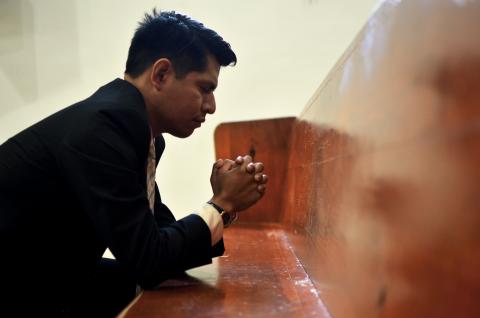Lessons from Nehemiah on Interceding for Your Church!
A number of years ago I was taking some time to fast and pray, feeling convicted of my own spiritual, Laodicean condition. That's when I felt God calling me to also fast and pray for my church, and especially for those who serve in positions of leadership. This started me on a beautiful journey to this day, seeking to be like Aaron and Hur holding up the hands of Moses (Exodus 17:12). Often times my heart has been broken as I've prayed. I have also had the privilege of watching pastors, church administrators, ministry leaders, laity, and many others plead before God with breaking hearts, too — all with one primary cry: "Oh Lord, please build up the walls around your people. Please save our church!"
What breaks your heart? What drives you to your knees? Has your heart ever been broken for your church or for those around you whose spiritual walls have fallen down?
It's easy to complain about your pastor or about things that don't seem to be going right, but have you ever spent time earnestly fasting and pleading with God for the Holy Spirit’s power to be upon those who lead? Have you ever fasted and prayed for your church, for fellow church members, for those in ministry, or for those in positions of spiritual need? Have you prayed prayers that go beyond “Please bless my church,” to "Please save those who attend my church, and please save me!” —? These are deep, heartfelt prayers pleading with God for healing, hope, and effective witness in an age of lukewarm, Laodicean Christianity. And these are the kinds of prayers that our world desperately needs.
Nehemiah prayed these kinds of prayers.
In Nehemiah chapter 1, we find King Artaxerxes’s cup-bearer heartbroken and weeping for his city and God's broken-down temple.
The children of Israel had been taken captive. The city of Jerusalem was destroyed, and along with it, the temple. Years later, this scattered nation is now free. Ezra and others return to Jerusalem and begin the task of rebuilding the temple. But they cannot seem to make progress because of the attacks of enemies who do not want to see God’s temple — or His people — restored. They have no protection from enemies because the walls of Jerusalem lay in shambles all around the city. They are discouraged and struggling.
When Nehemiah learns of their plight from far away, it breaks his heart. He “...sat down and wept, and mourned for many days” (Nehemiah 1:4). Wept. Mourned. For days. He is grieving for his city, his people, and the temple. His heart is breaking for his church. Not just for the building, but for the people and for their witness to the nations around them. He does not want the enemy to win. And so, he fights for his church.

Fasting and Praying Required
“I was fasting and praying before the God of heaven...” (Nehemiah 1:4). He begins battling for his church by spending time fasting and praying. He knows where to go to find the power and resources to win this battle. To God. And he knows that this is no ordinary battle. It requires more than just a “bless our efforts” prayer. It requires committed fasting and prayer.
The disciples once questioned Jesus about why they weren’t able to heal a man’s son. They had healed many people and participated in miracles. But for some reason, they couldn’t seem to free this child from the demon out to destroy him. “Why could we not cast it out?” (Matthew 17:19). Jesus told them, “...this kind does not go out except by prayer and fasting” (Matthew 17:21). There are battles to be prayed that require the commitment that fasting brings to the heart of the prayer. Nehemiah recognizes that this is one of those moments. His breaking heart drives him to fast and pray for his people and church.
As he prays, he spends time praising God for who He is: “O great and awesome God, You who keep Your covenant and mercy with those who love You and observe Your commandments...” (Nehemiah 1:5). Nehemiah begins praying by praising God — not because he’s attempting to get on God’s good side and thus receive the answer he wants, but because it reminds him of who God is, what He has promised, and how He loves and cares for His people.
While his heart is heavy for his church, he next spends time confessing sin. He wants to make sure things are right between himself and God before making any requests. “...I pray before You now, day and night, for the children of Israel Your servants, and confess the sins of the children of Israel which we have sinned against You” (Nehemiah 1:6). Nehemiah confesses the sins of God’s people, and sees himself as part of the sinful group who has caused offense. “Both my father’s house and I have sinned” (verse 6). He recognizes that it’s not just everyone else who has sinned, but himself, also. He takes on the responsibility of the entire nation and confesses their corporate sin.
Nehemiah knows that God is merciful and forgiving. He knows God promised that He would never abandon nor forsake His people (Deuteronomy 31:6). Even though He allowed them to be taken captive, He still sees them, loves them, and has a plan for them. The often-quoted promise in Jeremiah 29:11 — that God has a plan that includes hope for His people — is given right after His people are told that they will be in captivity for 70 years. God encourages them to live there — to build houses and “...plant gardens and eat their fruit” (Jeremiah 29:28). They are going to be captive for a while. So, live there, God says. But He promises them that He has a plan.

Praying God’s Promises
Nehemiah reminds God of His promises. He prays God’s Word right back to Him, claiming the promises God made to His people. “Remember, I pray, the word that You commanded Your servant Moses, saying, ‘If you are unfaithful, I will scatter you among the nations; but if You return to Me, and keep My commandments and do them, though some of you were cast out to the farthest part of the heavens, yet I will gather them from there, and bring them to the place which I have chosen as a dwelling for My name’” (Nehemiah 1:8-9). He claims God’s promise, believing God will answer. Then he gets back to work.
Yet when he shows up in front of the king, he is still heartbroken and grieving — still longing for his church to be rebuilt and his people protected from the enemy. And the king immediately sees it. He knows Nehemiah. He knows that Nehemiah is a man of joy and peace. He doesn’t typically walk around grieving. So, the king asks, “What’s wrong, Nehemiah?” (Nehemiah 2:2, paraphrased)
Nehemiah tells him about the plight of his people.
“What do you request?” asks the king.
Nehemiah recognizes the king’s question as God’s possible answer to his prayers. He’s been watching and waiting for God to answer. Expecting God to answer, he sends up a quick prayer (Nehemiah 2:4), and then confidently asks the king for help. And not just a little help. He asks for huge things.
“...send me to Judah…that I may rebuild it” (Nehemiah 2:5).
The king asks, “How long will you be gone?” And Nehemiah gave “him a time” (Nehemiah 2:6 ESV). As we continue reading the story, we see that Nehemiah is gone for 12 years. So, he’s not asking for a couple of weeks off work, but a dozen years.
“Furthermore I said to the king...” (verse 7). He’s not done yet! He asks for letters that will ensure his safe passage all the way to Jerusalem, as well as timber from the king’s own forest for the reconstruction effort (verse 8).
“And the king granted them to me according to the good hand of my God upon me” (Nehemiah 2:8). Nehemiah recognizes that the king answers these audacious requests because of God. Not only does the king give Nehemiah all he requests, but he also sends captains of the army with him to protect him on this journey. God is answering Nehemiah’s prayers to the utmost!

Trusting God to continue to answer and be with him, Nehemiah heads off to Jerusalem and leads the rebuilding efforts. It’s not an easy task. The enemies don’t give up easily and continue to attack. But they are no match for the prayers of a heart that is breaking for God’s people and church. Nehemiah and God are successful. The wall is rebuilt, the city fortified, the people encouraged — the enemy defeated.
“So the wall was finished on the twenty-fifth day of Elul, in fifty-two days. And it happened, when all our enemies heard of it, and all the nations around us saw these things, that they were very disheartened in their own eyes; for they perceived that this work was done by our God”
Nehemiah 6:15-16 (emphasis added)
“There is need of Nehemiahs in the church today — not men who can pray and preach only, but men whose prayers and sermons are braced with firm and eager purpose... The success attending Nehemiah’s efforts shows what prayer, faith and wise, energetic action will accomplish.”1
Yes, we need Nehemiah’s in the church today. People whose hearts are breaking for the church. People who are compelled by their love for God and His people to spend time fasting and praying for the church. People who are willing to ask God for big things — and then expect Him to answer. People who don’t just sit back and watch, but become part of God’s answer by getting involved, speaking up, and standing strong. God needs men and women of prayer and men and women of action. He needs people who will courageously be part of the rebuilding — not just that of a physical building, but of people’s lives.
The World is Waiting: Repent and Get Right With God
I've heard it said that "The church is waiting for the world to repent and get right with God, while all along the world has been waiting for the church to repent and get right with God." Yes, when the church rebuilds its broken-down walls and returns to its first Love, let me assure you, the world will take note. And they will come flocking to know the God we love and serve!
Let's pray that we can be courageous and take the first step toward becoming Nehemiah’s in today's generation. Let's ask that God would break our hearts for our church and for those in need!
Just to recap — the condition of the church broke Nehemiah’s heart. His response is a great outline for you as you pray for your church and those in spiritual need!
- He fasted and prayed.
- He praised God.
- He confessed sin.
- He claimed God’s promises.
- He asked for huge things.
- He got involved.
Call to Action
It's time we fast and pray, praise God, confess our sins, claim God's promises, ask for huge things and get involved. Jesus is coming soon! Let's allow Him to break our hearts with the things that break His. Let's be His intercessors standing in the gap for a church (and a world) in need.

Unless noted otherwise, scripture taken from the New King James Version®. Copyright © 1982 by Thomas Nelson. Used by permission. All rights reserved.
- Ellen G. White, Christian Service (Hagerstown, Maryland: Review and Herald Publishing Association, 1925), 177.




